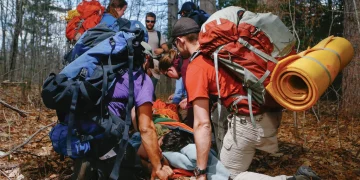The wilderness is a place of breathtaking beauty and serenity, but it is also an environment that can challenge even the most seasoned adventurer. While much attention is given to the physical risks of surviving in the wild, it is equally important to consider the psychological toll that such an experience can have. Whether you’re embarking on a solo expedition, a group trek, or simply enjoying a camping trip, understanding the mental challenges posed by the wilderness is essential for your safety and well-being.
In this article, we explore the various psychological challenges one might face in the wilderness, including isolation, fear, fatigue, and the mental resilience required to overcome them. We’ll also discuss how to prepare yourself mentally before heading out and strategies for managing these challenges while in the wild.
1. The Reality of Wilderness Isolation
One of the most profound psychological challenges in the wilderness is isolation. When you’re far from civilization, cut off from the noise of the modern world, you may feel a profound sense of loneliness or even desolation. This feeling is natural, but it can also be overwhelming, especially if you’re unprepared for it.
Why Isolation Affects Us
Humans are social creatures, and we rely on social interaction for emotional support, safety, and mental stability. In the wilderness, this support system is often non-existent. This lack of connection can trigger feelings of anxiety, sadness, or helplessness. The wilderness may also magnify personal issues, as there’s little distraction from internal thoughts and emotions.
The psychological effects of isolation can vary depending on the person. Some might thrive in solitude, experiencing a sense of peace and clarity. Others may feel extreme stress, depression, or even panic.
How to Combat Feelings of Isolation
Mental Preparation: Before heading out, it’s essential to mentally prepare yourself for the possibility of long periods alone. Reflect on your relationship with solitude and how you typically respond to loneliness. This self-awareness will help you manage your expectations and emotions.
Staying Busy: Keep your mind occupied with activities like hiking, photography, journaling, or reading. Tasks that require focus, such as building a shelter or making a fire, can provide a sense of accomplishment and purpose, helping to alleviate the effects of isolation.
Stay Connected: If you’re on a longer trip, consider ways to maintain some connection to the outside world, such as satellite phones, radios, or scheduled check-ins with loved ones. While you don’t want to be overwhelmed with distractions, having a safety net can provide comfort in challenging moments.

2. The Fear Factor: How the Wilderness Can Trigger Anxiety
Fear is a natural human response to the unknown. In the wilderness, this response can be amplified, especially when faced with unfamiliar terrain, wildlife, or the uncertainty of the environment. The fear of getting lost, encountering dangerous animals, or simply being unprepared for a harsh survival situation can trigger anxiety, even in experienced adventurers.
Why Fear Can Paralyze You
Fear, while protective, can sometimes be paralyzing. The vastness and unfamiliarity of nature can make even seasoned wilderness explorers feel small and vulnerable. This feeling of vulnerability can escalate into a full-blown anxiety attack, especially in moments of uncertainty.
Fear of the Unknown: The wilderness often presents unpredictable situations, like sudden weather changes, unexpected animal encounters, or difficult terrain. These uncertainties can trigger fear of the unknown, especially for those not accustomed to such experiences.
Fear of Injury or Death: The threat of injury or death, however unlikely, is a real concern in the wilderness. For some, the thought of being injured in a remote location can induce overwhelming fear, potentially hindering rational thinking and decision-making.
Overcoming Fear in the Wilderness
Stay Informed: One of the best ways to combat fear is knowledge. Before venturing into the wilderness, learn as much as you can about the terrain, potential hazards, and how to mitigate risks. Understand the wildlife in the area and how to behave around it. Being prepared can turn fear into a manageable challenge.
Mindfulness and Breathing: In moments of anxiety, deep breathing exercises or mindfulness techniques can help calm the nervous system. Slowing down your breath and focusing on the present moment can help you regain control of your thoughts and actions.
Positive Visualization: When you start to feel fear creeping in, use positive visualization to redirect your energy. Imagine yourself succeeding in your tasks, overcoming challenges, and thriving in the wilderness. This technique can empower you and reduce the feeling of helplessness.
3. The Weight of Fatigue: Mental and Physical Exhaustion
Fatigue is another psychological challenge that can severely impact your wilderness experience. Both physical and mental exhaustion can set in when you’re pushing yourself too hard or dealing with harsh conditions, creating a cycle of diminishing performance and increasing mental strain.
The Effects of Fatigue on Your Mind
When you are physically tired, your mental resilience also weakens. You become more susceptible to negative thoughts, feelings of frustration, and even despair. Exhaustion can impair your ability to think clearly, make sound decisions, or even navigate effectively. This is particularly dangerous in the wilderness, where the stakes are higher, and mistakes can have serious consequences.
How to Prevent and Manage Fatigue
Pace Yourself: The wilderness often demands a steady pace, whether it’s during a long hike, a kayaking expedition, or a multi-day trek. Overexertion can quickly lead to fatigue, both physically and mentally. Always pace yourself and listen to your body’s signals. Take breaks when necessary and avoid the temptation to push yourself beyond your limits.
Proper Nutrition and Hydration: Fueling your body with the right nutrition and staying hydrated are crucial to maintaining mental and physical energy levels. Dehydration and poor nutrition can exacerbate fatigue and make it more difficult to concentrate or stay positive.
Rest and Recovery: Don’t underestimate the power of rest. A good night’s sleep in a safe shelter can rejuvenate your energy levels, both physically and mentally. If you’re feeling exhausted, prioritize recovery and take it easy for a day or two.

4. Survival Stress: Managing Mental Resilience
Survival situations can introduce extreme stress, whether you’re lost, injured, or facing inclement weather. Stress is a natural response to danger or discomfort, but too much of it can erode your decision-making ability and willpower. Mental resilience is key to overcoming these stressful situations.
The Role of Mental Resilience in Survival
Mental resilience involves the ability to stay calm, focused, and adaptive in the face of adversity. It’s about maintaining hope and clarity of thought, even when circumstances seem bleak. In the wilderness, where your survival depends on your ability to think critically and adapt, this psychological trait is essential.
How to Build Mental Resilience
Self-Confidence and Optimism: Believing in your ability to overcome challenges is crucial for maintaining mental resilience. Cultivate a positive mindset, even in difficult circumstances. Focus on what you can control, and take pride in small victories along the way.
Stress Management Techniques: Techniques like mindfulness meditation, progressive muscle relaxation, or even simple breathing exercises can help you manage acute stress. Developing these techniques before your trip can prepare you for the inevitable moments of tension.
Stay Solution-Focused: When faced with a problem or obstacle in the wilderness, try to stay solution-oriented. Focus on the steps you can take to address the issue rather than getting lost in worry or fear. Small, practical actions often lead to big improvements in your situation.
5. Dealing with Boredom: The Hidden Psychological Challenge
Boredom in the wilderness is an often-overlooked psychological challenge. While the wilderness is undoubtedly beautiful, extended periods of downtime can lead to feelings of listlessness or frustration. If you’re not prepared for the stillness, you might find yourself struggling with an overwhelming sense of monotony.
Why Boredom Can Be Troubling
Boredom can arise when the environment feels unchanging, or when the weather prevents you from engaging in your usual activities. Without the distractions of modern life, you may feel restless, anxious, or even a sense of purposelessness. These feelings can quickly spiral into negative thought patterns if left unchecked.
How to Manage Boredom in the Wilderness
Create a Routine: A sense of structure can help break the monotony. Establish a routine for your day, whether it’s focused on a survival task, hiking, or simply exploring the area. Keeping busy with intentional activities can stave off feelings of boredom and maintain a sense of purpose.
Engage with Nature: Instead of focusing on what you can’t do, immerse yourself in what you can. Engage with the natural world around you. Observe the wildlife, take note of the changing landscape, or focus on the sound of the wind in the trees. This shift in focus can create a new level of appreciation for your environment and stave off feelings of dissatisfaction.
Learn New Skills: The wilderness is an excellent place to learn and practice new skills. Whether it’s building a shelter, foraging for food, or learning about animal tracks, expanding your skill set can help you stay mentally engaged and excited about your adventure.
Conclusion: Are You Mentally Ready for the Wilderness?
The wilderness offers both incredible beauty and undeniable challenges. While physical preparation is key, mental preparation is equally important. The psychological challenges of isolation, fear, fatigue, stress, and boredom can have a profound impact on your wilderness experience. However, by understanding these challenges and adopting strategies to manage them, you can not only survive but thrive in the wild.
Are you ready for the psychological demands of the wilderness? Equip yourself with the knowledge and mental tools to face whatever the wild throws your way, and you’ll find that it’s not only the external world that you’ll be conquering but also your own inner landscape.























